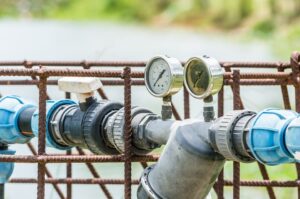Irrigation Well Drilling – Everything You Need To Know
Few people realize how much an irrigation well may save homeowners money in the long run while safeguarding their landscaping investment when installing a lawn sprinkler system or expanding landscaping to a new portion of the yard. 
The following is a collection of frequently asked questions concerning irrigation wells that we get at Jon’s Well and Pump Services LLC.
What Is The Purpose Of An Irrigation Well?
An irrigation well is identical to a well drilled to provide water to a household, with the exception that the water is connected to a sprinkler system or faucet for use outside the house.
Because you are not using municipal water, you will not be charged for it on your water account, saving you a lot of money.
These wells must be installed by a professional well drilling firm, but you can discuss how to best include an irrigation well as a source with your landscape designer or sprinkler system installation.
Is It Possible For Me To Drill An Irrigation Well On My Property?
If you want to drill an irrigation well, you’ll need enough space in your yard to accommodate the heavy machinery required. This equipment will also require access to and from the property.
Consider where it would be located once the feasibility has been determined. The well will be more expensive the further it is from the house and the irrigation system because additional excavation and tubing will be required for the connection.
Consider whether or not you want to enlarge your home. Because wells can’t be moved, make sure it’s not in the way of adding a new room to your house.
Are There Any Limitations To Where The Well Can Be Drilled?
Well drilling restrictions vary by municipality and state, but the majority demand certain setbacks from property boundaries, structures, and wetlands.
Find out if there are any other wells on your land or within 100 feet of it before calling a well drilling business. Investigate the locations of local wetlands, streams, and ponds as well.
This will assist you in answering some of the questions posed by the well drilling firm.
How Deep Is It Going To Be?
There are two types of irrigation wells. A shallow well is one that is less than 50 feet deep and is also known as a dug well.
It pulls water from the earth and can supply enough water for a medium-sized garden. Aquifers are accessed through bedrock wells, which are bored deep into the ground.
Both are capable of delivering the required 10 gallons of water per minute.
How Expensive Is It?
Depending on the region, drilling a well might cost anywhere from $8,000 to $15,000.
However, by saving money on water bills, a homeowner can repay a significant portion of the expense.
For those of us who live in Florida, we understand high water bills!
Irrigation well drilling cut that water bill cost significantly, helping to defray the installation costs.
Are Irrigation Wells Environmentally Harmful?
Irrigation wells use a modest amount of water to irrigate your lawn. The water is returned to the ground, assisting in the replenishment of groundwater supplies. The water is also untreated, unlike municipal water, which prevents minor amounts of chemicals from being released into the environment.
Looking for a top-rated irrigation well drilling company in Florida? Call Jon’s Well and Pump Services LLC or send us an email.
Irrigation Well Drilling FAQs
How much does it cost to drill an irrigation well?
Drilling an irrigation or agricultural well costs $25 to $50 per foot or $85 to $105 per foot for a complete installation. Residential irrigation wells cost $9,000 to $15,000 on average, while many high-yield commercial wells cost $50,000 to $100,000, which typically includes the pump.
How deep should an irrigation well be?
In order to allow for maximum ground filtration to remove impurities, your well depth should be at least 100 feet. As a general rule, the deeper you drill, it's more likely that there will be minerals present.
How long do irrigation wells last?
The average lifespan for a well is 30–50 years.

